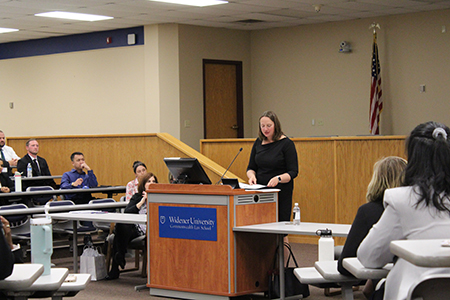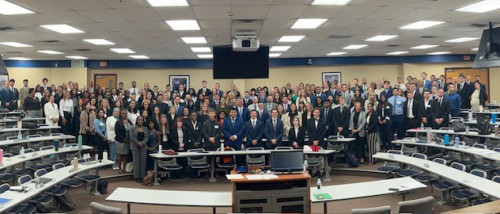
'A Noble Profession of Service’: Incoming Widener Law Commonwealth students pledge to uphold justice
Widener University Commonwealth Law School officially welcomed its newest class of law students with the "Welcome to the Profession" ceremony, a tradition designed to highlight the ethical responsibilities and professional standards that these future lawyers will uphold throughout their careers. The ceremony, marked by insightful speeches and personal reflections, served as both an induction into the legal profession and a moment of reflection for the students.
The event began with a warm address from Abbigale Agosti, president of the Student Bar Association, who emphasized the importance of community and collaboration as the students embark on their legal education. The 170 students in this year’s class come from 21 states—including Alaska, California, Florida, and Texas—as well as several countries, bringing a rich diversity of backgrounds and perspectives to Widener Law Commonwealth.
Dean and Professor of Law, andré douglas pond cummings, set the tone for the ceremony with his remarks, underscoring the significance of the ethical duties that come with being a lawyer. “The Welcome to the Profession ceremony is an opportunity for entering law students to recognize the importance of the ethical responsibilities they will undertake as lawyers,” cummings said. “Lawyers take an oath to represent their clients to the best of their abilities in an ethical, honest, and trustworthy fashion. It is crucial that law students understand from day one the qualities and characteristics they need to embody as they become professionals.”
 The keynote address was delivered by Judge Karoline Mehalchick, U.S. District Court for the Middle District of Pennsylvania and the law school’s jurist in residence. Judge Mehalchick’s words resonated deeply with the students, many of whom found her insights into the legal profession both inspiring and sobering. “As lawyers, you play a vital role in our society,” Mehalchick said. “This week, you are embarking on a career in a noble profession of service and advocacy. The law demands not only intellect and skill but also a deep commitment to justice and fairness.”
The keynote address was delivered by Judge Karoline Mehalchick, U.S. District Court for the Middle District of Pennsylvania and the law school’s jurist in residence. Judge Mehalchick’s words resonated deeply with the students, many of whom found her insights into the legal profession both inspiring and sobering. “As lawyers, you play a vital role in our society,” Mehalchick said. “This week, you are embarking on a career in a noble profession of service and advocacy. The law demands not only intellect and skill but also a deep commitment to justice and fairness.”
For students like Isabela Hernandez, a full-time student and first-generation law student, Mehalchick’s speech was particularly impactful. “As an immigrant, navigating the legal system was confusing, especially with English being my second language,” Hernandez shared. “I want to provide a safety net for people experiencing the same challenges my family and I faced. The oath of professionalism was incredibly inspiring, and Judge Mehalchick’s speech gave me a real sense of the pressures and responsibilities ahead.”
Hernandez, like many of her peers, is driven by a strong sense of purpose. Initially considering a career in immigration law, she is now also exploring employment law. The diversity of interests and backgrounds in this year’s class is a testament to the broad array of legal paths that Widener Law Commonwealth students are pursuing.
Mackenzie Mueller, a student from East Stroudsburg, Pennsylvania, also found herself reflecting on the journey that led her to law school. “I never anticipated going to law school when I started my higher education journey,” Mueller said. “After earning my master’s in political science and working in the political sphere in Harrisburg with the Pennsylvania State Senate, I realized law school was a natural next step to further my career. There are many ways to make change, and the judicial system is a powerful avenue to protect what’s right or initiate necessary changes.”
The ceremony wasn’t just about looking forward to the future; it also provided students with the opportunity to reflect on the experiences that brought them to this point. Lauren Walters, who attended Lebanon Valley College and majored in English, recalled how her coursework in the pre-law program solidified her decision to pursue a career in law. “Delving into legal complexities and reading cases confirmed my desire to pursue a career in law, which led me here,” Walters noted.
William Rafferty, another student in the incoming class, was drawn to Widener Law Commonwealth by his passion for environmental law. “I chose Widener Law Commonwealth because of my strong interest in environmental law and the opportunity to be part of the Environmental Law and Sustainability Center,” Rafferty said. “This week’s orientation has been reassuring. It’s clear that this school genuinely cares about our success, and I’m glad I made the decision to come here.”
For students like Nwadi Onyeukwu, who hails from New York, this commitment to justice is deeply personal.
“What put me on this path is that I wanted to make a difference in the world by helping women, especially domestic violence victims and children who have been through child abuse and neglect,” she shared. “Basically, everything within family law—I want to make a change, and that’s why I chose to pursue a career in law.”
Mehalchick’s address touched on several core principles of professionalism, from the importance of continuous learning to the need for respect and courtesy in legal practice. “Professionalism means maintaining a courteous and civil attitude towards all involved in the legal system, even when you must zealously pursue your client’s legitimate interests,” she advised. “You can have a zealous argument in the courtroom, but afterward, you shake hands with opposing counsel and walk away, maybe not as best friends, but certainly with mutual respect.”
The ceremony also included remarks from alumna Cheri Sparacino ‘18, an associate attorney at Buchanan, Ingersoll, and Rooney. Sparacino shared her journey from law school to her current role, offering the incoming students a glimpse of the challenges and rewards that lie ahead. Her reflections provided a valuable perspective for the new class, reinforcing the idea that the path to becoming a lawyer is both demanding and deeply fulfilling.
Assistant Dean of Students Randi Teplitz, emphasized the day’s importance in setting the tone for the students’ legal education. “The duty of lawyers to maintain the highest level of civility, integrity, and morality is central to the legal profession,” Teplitz noted. “By taking the affirmation of professionalism, they have pledged to model the ethical responsibilities and values that are expected of them throughout their time in law school and as they step into their careers.”
As the ceremony drew to a close, it was evident that the event was more than a formality—it was a meaningful induction into the legal profession, a moment of reflection and commitment that will resonate with the students throughout their legal education and beyond.
